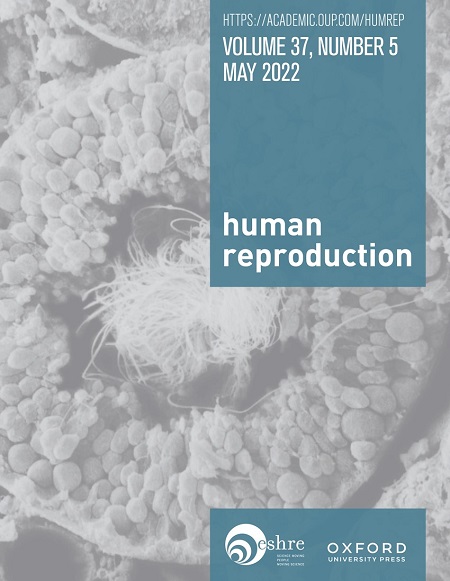P-519配子捐献与非配子捐献辅助生殖技术(ART):患者情绪与心理支持需求的比较
IF 6
1区 医学
Q1 OBSTETRICS & GYNECOLOGY
引用次数: 0
摘要
研究问题:使用自己或捐赠的配子接受抗逆转录病毒治疗的患者需要什么心理支持?他们的主要情绪是什么?配子捐献的抗逆转录病毒治疗对患者的情绪影响更大。在治疗过程中给予适当的心理支持是有帮助的。面临不孕症的夫妇通常会求助于辅助生殖技术。这可能会导致心理困扰,由于治疗的不确定性,身体紧张,和经济压力。在意大利,配子捐赠的抗逆转录病毒治疗周期显著增加,从2015年的2,287次(占抗逆转录病毒治疗活动的3.2%)增加到2022年的14,543次(15.2%)。许多研究报告称,配子捐赠涉及到复杂的情感。虽然它给父母带来了希望,但夫妇们可能会经历复杂的情绪,包括失去血缘关系的悲伤,对孩子起源的怀疑,对捐赠者的矛盾态度。这种情感上的复杂性凸显了有针对性的心理支持的必要性。在2021年至2023年期间,意大利ART登记处(IARTR)与动态和临床心理学与健康研究系(Sapienza大学)合作,提出了两份在线问卷,针对接受ART捐赠和非捐赠治疗的患者,在两个不同的时间框架内进行了调查。该研究旨在比较接受抗逆转录病毒治疗的患者与自己或捐赠配子的情感领域和需求。参与者/材料、环境、方法共225例接受自身配子ART治疗的患者(“非供体患者”)和186例接受配子捐赠ART治疗的患者(“供体患者”)完成问卷。比较各组的社会人口统计学特征,ART中心提供的心理咨询的可用性和类型,以及对ART周期体验的情绪反应。主要结果是患者与ART治疗相关的情绪领域。统计分析采用学生t检验和卡方检验。与非供体患者(37.4岁)相比,供体患者明显年龄大(41.5岁),尝试怀孕的时间更长(>;4年对&;lt;3年),接受ART周期近少一个(1.6比2.4)。捐精夫妇与朋友(16.7%对64.4%)和同事(3.8%对23.1%)讨论不孕状况的频率低于非捐精夫妇。心理医生在中心的存在(88.7%对56.4%)和提供心理咨询(65.6%对29.8%)更常与供体患者沟通。因此,供体患者比非供体患者更频繁地在ART中心接受心理咨询(53.8%比34.7%)。捐赠夫妇发现心理支持在评估治疗方案和怀孕期间特别有用,而非捐赠患者在整个治疗过程中更希望得到支持。关于抗逆转录病毒治疗过程中所经历的情绪,与接受抗逆转录病毒治疗的患者相比,未接受抗逆转录病毒治疗的患者报告的悲伤、愤怒和恐惧程度明显更高。他们还把更多的悲伤和愤怒的感觉归咎于他们的伴侣。这种差异可以解释为非供体患者心理咨询的可获得性和利用率较低。调查的结果需要更大的样本量来证实,这样才能更好地代表供体患者和非供体ART患者的各种情绪体验。在接受抗逆转录病毒治疗的患者中,有配子捐赠或没有配子捐赠的患者出现了不同的临床和情感体验。需要了解这些不同的经历,以便提供适当和有意识的心理支持,以处理在特定的抗逆转录病毒治疗期间经历的特定情绪感受。需要进一步调查。试验注册号本文章由计算机程序翻译,如有差异,请以英文原文为准。
P-519 Assisted Reproductive Technology (ART) with or without gamete donation: comparison between patients’ emotions and need for psychological support
Study question What is the need for psychological support and what are the main emotions felt by patients undergoing ART with own or donated gametes? Summary answer ART treatment with gamete donation results more emotionally charged for patients. It would be helpful for them to receive adequate psychological support during the treatment. What is known already Couples facing infertility often turn to Assisted Reproductive Technology. This may cause psychological distress due to treatment uncertainty, physical strain, and financial pressures. In Italy, ART cycles with gamete donation have risen significantly, from 2,287 (3.2% of ART activities) in 2015 to 14,543 (15.2%) in 2022. Many studies report the complexity of feelings involved in gamete donation. While it offers hope for parenthood, couples may experience mixed emotions, including sadness of losing biological ties, doubt about disclosure of the child’s origins, ambivalent attitudes towards the donor. This emotional complexity highlights the need for targeted psychological support. Study design, size, duration Between 2021 and 2023 the Italian ART Registry (IARTR), in collaboration with the Department of Dynamic and Clinical Psychology and Health Studies (Sapienza University) proposed two online questionnaires created ad hoc for the survey in two different time frames to patients underwent ART donor and non-donor treatments. The study aimed to compare the emotional sphere and needs of the patients underwent ART treatment with own or donated gametes. Participants/materials, setting, methods A total of 225 patients undergoing ART with own gametes (“non-donor patients”) and 186 patient undergoing ART with gametes donation (“donor patients”) completed the questionnaire. The groups were compared on socio-demographic characteristics, availability and type of psychological counseling offered within ART centers, and emotional responses to ART cycle experience. The primary outcome was the patients' emotional sphere related to ART treatments. Statistical analysis was conducted using Student’s t-test and Chi-square test, where appropriate. Main results and the role of chance Donor patients are significantly older (41.5 years) compared to non-donor patients (37.4 years), have been trying to conceive for a longer time (>4 years vs. <3 years), and have undergone nearly one fewer ART cycle (1.6 vs. 2.4). Donor couples discuss their infertility condition less frequently than non-donor couples, both with friends (16.7% vs. 64.4%) and with colleagues (3.8% vs. 23.1%). The presence of a psychologist at the center (88.7% vs. 56.4%) and the offer of psychological counseling (65.6% vs. 29.8%) were communicated more often to donor patients. Consequently, donor patients received psychological counseling at the ART center more frequently than non-donor patients (53.8% vs. 34.7%). Donor couples found psychological support particularly helpful during the evaluation of treatment options and during pregnancy, whereas non-donor patients would have preferred support throughout the entire treatment process. Regarding emotions experienced during the ART process, non-donor patients reported significantly higher levels of sadness, anger, and fear compared to donor patients. They also attributed more feelings of sadness and anger to their partners. This discrepancy could be explained by the lower availability and utilization of psychological counseling among non-donor patients. Limitations, reasons for caution The results of the survey should be confirmed with a larger sample size that can better represent the variety of emotional experiences of both donor patients and non-donor ART patients. Wider implications of the findings A different clinical and emotional experience emerges between patients undergoing ART with or without gamete donation. These different experiences need to be known in order to provide appropriate and conscious psychological support to process the particular emotional feelings experienced during a specific ART treatment. Further investigation is needed. Trial registration number No
求助全文
通过发布文献求助,成功后即可免费获取论文全文。
去求助
来源期刊

Human reproduction
医学-妇产科学
CiteScore
10.90
自引率
6.60%
发文量
1369
审稿时长
1 months
期刊介绍:
Human Reproduction features full-length, peer-reviewed papers reporting original research, concise clinical case reports, as well as opinions and debates on topical issues.
Papers published cover the clinical science and medical aspects of reproductive physiology, pathology and endocrinology; including andrology, gonad function, gametogenesis, fertilization, embryo development, implantation, early pregnancy, genetics, genetic diagnosis, oncology, infectious disease, surgery, contraception, infertility treatment, psychology, ethics and social issues.
 求助内容:
求助内容: 应助结果提醒方式:
应助结果提醒方式:


